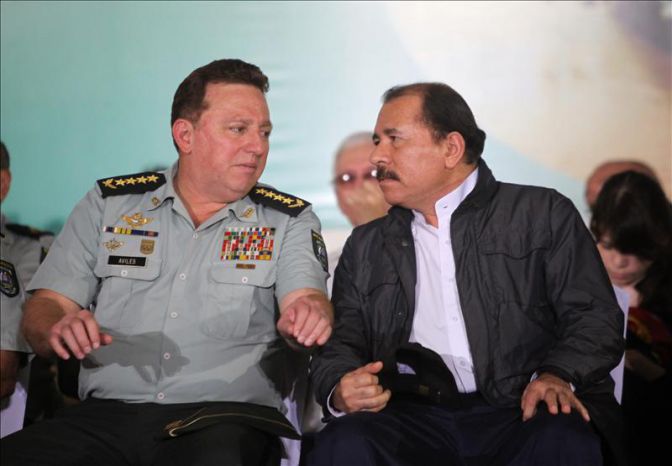14 de agosto 2019

Children of Exile: The Births “Sowing Hope” in the Camp of Nicaraguan Farmers

PUBLICIDAD 1M
PUBLICIDAD 4D
PUBLICIDAD 5D
“Since 2010, the Army showed a vocation of party subordination to the regime”.

Army Chief Gen. Julio Cesar Aviles along with president Daniel Ortega. File photo: Confidencial / EFE
HAVANA TIMES – “Army ranks with their terms expired, all types of business as a priority, party subordination as a rule, complicity in crimes against humanity, persecution and killing of peasants, and active military officers working for institutions of the regime.” This is how the Nicaraguan security expert and founder of the Institute for Strategic Studies and Public Policies (IEEPP), Javier Melendez, describes the Nicaraguan Army.
Although the Army’s high command argues that it has remained outside the sociopolitical crisis and has also declared itself the victim of a “brutal smear campaign,” Melendez asserts that the military institution has behaved as “a partisan extension of the Ortega family.” An assessment that the Army rejects and alleges that it acts in accordance with the laws and the Constitution.
In this interview with Confidencial, Melendez talks about the viability of the Army in the future and about military succession, hitherto blocked by Army General, Julio Cesar Aviles, who by next year will have served a decade as head of the institution, questioned for his passivity to the actions of paramilitaries in the brutal repression against civic protests.
What role could the Army play in an eventual democratic transition?
I hope none. It is an institution trapped by the Ortega-Murillo regime and the issue here is what will be done with the Army in the transition. I am not sure if the option to abolish it is realistic. But at least everything related to democratic control should be retaken, accountability, the responsibility of the military command in making the Army a partisan extension of the Ortega family, the responsibility of the middle and senior commanders in logistics and intelligence for the extermination operations against the civilian population and without a doubt issues such as military education will be imperative subjects.
In the current circumstances of the country, can the Army survive this crisis?
The Army has been part of the crisis and it is not clear to me how an institution so politically subordinated to the regime could survive on current terms. The Army since 2010 showed a vocation for party subordination to the regime. We warned about it from IEEPP and nobody paid attention to that.
Afterwards, various officers were “given permission” to manage various state institutions (the Constitution prohibits the participation of militaries in these entities), dozens of retired officials also became part of the Government, in their noses swarm armed civilians who have slaughtered hundreds of people since April 2018.
This is the same institution that has exterminated hundreds of peasants since 2000, whom they accused of being bandits, and that now declares itself incompetent to disarm paramilitaries. With all this, without a doubt at least radical changes should be made. However, I think it will survive.
Is there disintegration of the Army?
Army ranks with their terms expired, all types of business as a priority, party subordination as a rule, complicity in crimes against humanity, persecution and extermination of peasants, and active military officers working for institutions of the regime…Well, I think that there is a lot of disintegration in that.
What do you think about the issue of succession in the Army?
In a military institution, the DNA of professionalism is the capacity it has to train military leaders who later strive to be promoted to commanders of the institution. That does not exist in the Nicaraguan Army. What you have there is a clique of generals who have known how to enjoy the honey of power by being unconditional to the regime. That creates serious and complex institutional tasks that end up creating a burdensome weight on societies, because the national treasury actually ends up fueling ambitious and corrupt commanders that deny the possibility of modernizing their institution.
I see a future in which we will have to see very carefully how far this cancer of ambition and high-ranking corruption spread in young officers. But, what I’m sure of is that when a young officer sees that his military career will eventually be blocked, he ends up being part of the corruption feast. Each level has its own thing.
What has happened with the Nicaraguan Army and the National Police is a brutal lesson on how irresponsibility in defense and security institutions ends up creating so many wounds and traumas in a country.
Archivado como:
PUBLICIDAD 3M
Periodista. Destaca en cobertura a violaciones de derechos humanos: desplazamiento forzado, tráfico ilegal en territorios indígenas, medio ambiente, conflictos mineros y ejecuciones extrajudiciales. Premio Iberoamericano Rey de España 2018.
PUBLICIDAD 3D